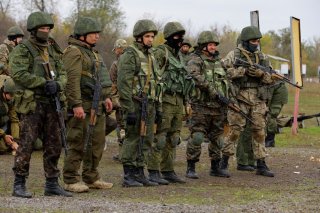Russia to Leave Borders Open Amid Draft Exodus
The Kremlin had previously acknowledged that its push for mobilization was poorly implemented in some areas, but remained committed to the broader effort.
Kremlin spokesman Dmitry Peskov claimed on Wednesday that the Russian government had no plans to close Russia’s borders—a step that some Russian commentators had proposed as a solution to the mass emigration of young men following the Kremlin’s disorganized effort to call up reservists for the war in Ukraine.
“No, [we are] not planning to,” Peskov said, responding to a question from Russia’s state-run RIA Novosti news network regarding Russian leader Vladimir Putin’s plans for the border. The Kremlin had previously acknowledged that its push for mobilization was poorly implemented in some areas, but remained committed to the broader effort.
Following Putin’s announcement of the mobilization on September 21, hundreds of thousands of Russians have fled the country in order to escape prospective military service. Although Putin vowed during that address that only 300,000 men with prior military experience would be called up, the true number of recruits is thought to be substantially higher than that, including many with no prior military experience. Russian security forces have also reportedly forced imprisoned anti-war protesters to enlist.
Due to the chaos surrounding the conscription effort, hundreds of thousands of Russian men eligible for the draft have fled the country. Although most European nations in the Schengen Area no longer allow Russians to enter, at least 100,000 have found refuge in Kazakhstan, which already has a sizable Russian minority and does not require Russian citizens to hold a foreign passport to visit.
Peskov’s comments came shortly after a Russian Security Council meeting at which Putin proclaimed martial law in Donetsk, Luhansk, Kherson, and Zaporizhzhia, the four regions of Ukraine that Russia “annexed” in late September, effective on midnight the following day. Putin emphasized that the new decree would not substantially change the situation on the ground in any of the four regions, as all of them have been under martial law since their occupation by the Russian military, but provided a quasi-legal basis for the continuation of that status.
In addition to the declaration of martial law, Putin introduced a lesser level of alert—described as a “mid-level response” in a summary of the meeting—in the areas of Russia adjacent to Ukraine and the Crimean Peninsula, which is internationally recognized as part of Ukraine but has been governed by Russia since 2014. In each of these regions, local authorities were reportedly granted additional powers in order to maintain stability.
Trevor Filseth is a current and foreign affairs writer for the National Interest.
Image: Reuters.

